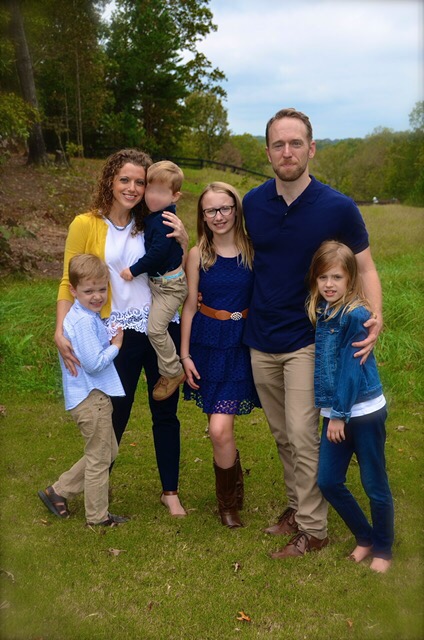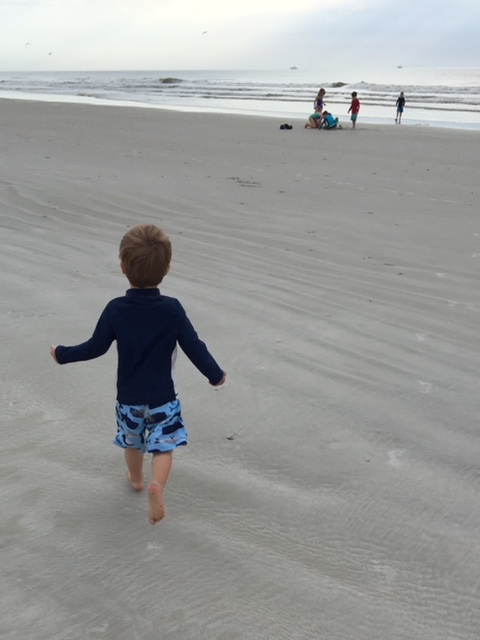Inside Out, Upside Down: An Interview with Nicole James
The following interview is a part of the Inside Out, Upside Down series, in which we will hear the stories of Christ-following families who have taken part in orphan care. To read more about the series, start here.
______________________________
I'm excited to introduce you today to my long-time friend, Nicole, and her awesome family. Nicole is a wife, mom, physician assistant, homeschooler, and foster mom to many. Read on to hear more about their family's journey in the foster care world.
Introduce yourself! What are your favorite family activities? Tell us about your family.
I am a physician assistant, musician, and homeschooling mother of four children—two girls (10 and 8) and two boys (6 and our 2 1/2 year old foster son). My eldest is a writer and a nurturer who loves animals, babies, and nature. My 8YO is an inventor who studies anatomy in her free time, sells her paintings on the side of the road, and hates socks. Both the boys are extremely loud and love music and drums. My 6YO dreams of playing the tuba and sharing a bunk bed with his little brother “if he gets to live with us.” And the littlest? He just learned how to tattle on his siblings and is obsessed with Thomas the Train and chapstick.
My husband is a pastor and church planter and we, together with local churches, are currently working to plant a cross-cultural church here in Athens, Georgia. I love making music, being outside, writing, and teaching. We are passionate about pursuing justice and reconciliation in our community.
When did you first begin to realize the great need in the foster care system? In what ways did the Lord draw you toward action on behalf of foster children?
When I was younger, I didn’t think I wanted to have any children. However, when I became a Christian, I was taught that God (in both the old and new testaments) was continually calling His people to love children and receive them as blessings. That we are to become as children before Him and, through Christ’s work on the cross, actually become His children. Adoption. That was a big shift for me.
God gave us five biological children—two of whom we never met as they were lost during pregnancy. Throughout these years, we both had some desire to pursue adoption. A few years ago, we attended an orphan care conference through Chosen for Life. It was there that I first learned of the foster crisis. At that time, there were over 200 children in foster care in Clarke county…and there were about 10 foster homes. Ten. These children were being placed in homes (or group homes…or hotels) hours away from their biological family, schools, and support networks.
We realized the most critical need for orphan care in Athens, GA meant fostering or adopting through DFCS. (Not to dismiss other avenues—just addressing the most critical need here.) But, honestly, I didn’t want to foster: too hard…too unpredictable…too many issues. So we decided to respite—which is to provide temporary relief for current foster families.
As we were completing paperwork for respite care, some children with whom we already had relationships came into foster care. The decision was clear. Suddenly, we were a foster family. We were uniquely placed to provide a stable home for children in crisis—allowing them to stay with people they knew, attend the same schools, maintain contact with their relatives, and give them the best chance for reunification with their family. It just made sense.
Those children went home to relatives. Other children have come and gone. Each placement has had its own dramatic beginning and unique path. Some children have come back into care and we have been able to serve as an emergency placement, giving DFCS time to evaluate the situation and place them with a relative.
What is your purpose or mission statement as a foster family? Are you ever able to interact with and minister to the biological parents of your foster children?
We don’t technically have a purpose/mission statement for our family. Foster care is just one way we can seek to fulfill the command of scripture to love the orphan and the widow—to give voice to some of those in our culture who have little or none. To be faithful.
Many of those women whose children come into care are functional widows. Our primary responsibility must be to the child, but we cannot love the child well without pursuing and supporting their biological parents (both, if possible!) and extended family—regardless of the legal outcome (reunification/adoption/etc).
Involvement in the foster system is often generational: children who are now in foster care are more likely to have children of their own in foster care. We want children to go home to healthy homes—and we believe God changes people, situations, and generational brokenness by the work of His Spirit through Jesus. It sounds like a cliche, and I still struggle to believe this in my own life and the mess around me. But we have seen it. So, we actively engage biological parents and any other (safe) family who want to be involved. We have firm boundaries and they sometimes get frustrated with us. But, we try to love them, show them respect, and encourage them. And we tell them about Jesus.
In what ways has the foster care process impacted your biological children?
Even at very young ages, children can understand the vision for orphan care. But we must let them in. They have a crucial role in this process and they are often the most effective in helping children feel more at ease in a crisis. We want to recognize, honor, and celebrate this role while leaving room for them to struggle.
Our children know about hard truths—we are a ministry family and I’ve worked in addiction medicine, so we talk about a lot of tough issues. But, through fostering, our children have come to know these things intimately. They have watched neglected children gorge on food and water to the point of vomiting….and start learning how to eat again. They have watched a “runner” (a child who runs away when he encounters stress) learn to play independently in the backyard without fear. They have watched a NICU baby go home to his humbled and grateful mommy. They also wept as we released that baby—that “baby brother”—back to his biological mom (after just 6 weeks).
That’s probably been the toughest challenge: helping them through the tension of wanting parents to succeed in bringing their children home…and not wanting the child to leave. They feel conflicted when they express their desire to adopt—because they know that means a child can never go back to their parents. Yet they love so freely and deeply, they can’t imagine life without these kids—especially when they have been with us for longer periods of time.
We foster as a family and we ask God to give us wisdom in honoring the children currently in our home and loving them well. I have seen instances where families become overwhelmed by the massive need—where healthy boundaries are not set—and the stability of the home suffers or collapses. We have struggled with this as well and constantly ask God for wisdom to balance home and mission. We don’t want to be insular and risk-averse….but we want to have something healthy to invite others into.
How has fostering turned your world inside out and upside down?
Fostering has made more obvious what has been true all along….about myself and my children (foster, biological, adoptive.…).
I have seen a depravity around me that takes my breath away. But I have also seen that same depravity within myself in new ways as we engage this process. We are supposed to be the rescuers, right?! But we are not. We seek to be faithful. But God is the Rescuer and He enables that faith.
Our children are not our own. None of them. They have been placed in our stewardship for a season. I don’t get to control how long that season is. They will all have “issues.” I don’t get to decide what those issues are. Our foster son is almost three and has been with us since he was seven months old. It has been a very long road for him, for his biological family, and for us. He will never be able to go home to his biological parents again. My six-year-old was crying about that today. That’s not the story I would choose to write for him.…but that’s the story God is writing. And He is good.
It is a humbling and powerless feeling. But I think it’s just where I need to be.
How has God deepened your understanding of His love as you’ve been involved in foster care?
The Jesus Storybook Bible (Sally Lloyd Jones) describes God’s love as “a Never Stopping, Never Giving Up, Unbreaking, Always and Forever Love.”
That kind of love makes more sense as I experience more of the brokenness in and around me. I still don’t understand it. I can’t offer it. But God works through me and despite me. And I can rejoice in His love and ask Him to help me believe.
What is one piece of wisdom you would tell a family as they begin the journey toward becoming foster parents?
The need is not the call. Scripture commands us to care for the orphan and the widow and those other voiceless peoples in our midst. That is the call. There is freedom in what that looks like for your family. Ask God. Ask for His specific direction in pursuing this call and every time you are asked to receive a child into your home. He delights to give you wisdom!
Consider your heart and motive. Foster care is not adoption. It can turn into adoption, but it is not adoption. There are currently 174 children in Georgia who are adoption-ready and waiting for an adoptive family (itsmyturnnow.dhs.ga.gov). 174 children asking for a home, and this is just in one state. If your heart is for adoption, find your state’s listing.
Build a support team—including someone who will nag you to take care of yourself, your marriage and biological children, and maintain healthy boundaries.
Every moment, every act, every decision to defend and care for a child matters. Regardless of whether or not they remember that moment. Regardless of whether they remain with you. God sees. Nitamwimbia bwana kea kuwa yeye Ameniona! (google it.)
…and keep extra toothbrushes!








